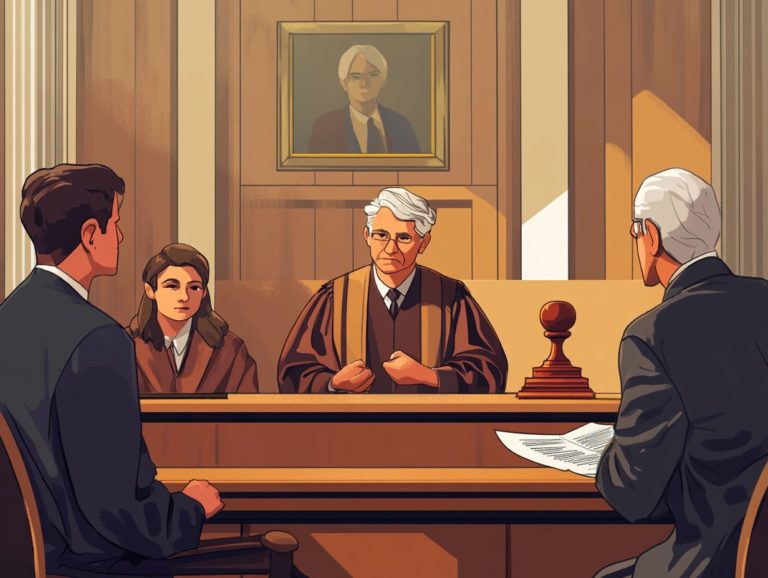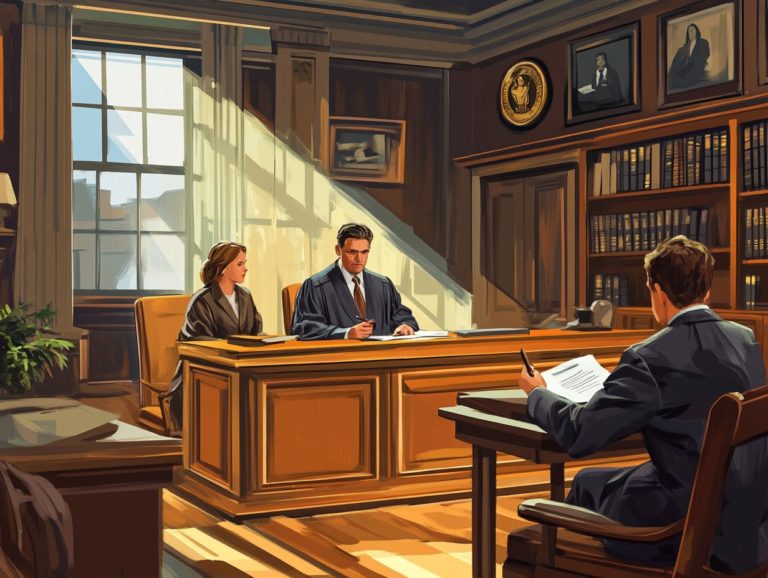The Right to Counsel: What You Should Know
The right to counsel stands as a fundamental pillar of justice, ensuring that you have access to legal representation, regardless of your circumstances.
This article navigates the key aspects of this right, emphasizing its significance in upholding fairness within our legal system. It explores when this right comes into play, whether in criminal or civil cases, and how you can secure legal counsel.
Challenges and limitations surrounding this vital right are also examined, providing you with a clearer understanding of your options and rights. Immerse yourself in this exploration to discover how the right to counsel influences you and shapes the broader legal landscape.
Contents
Key Takeaways:
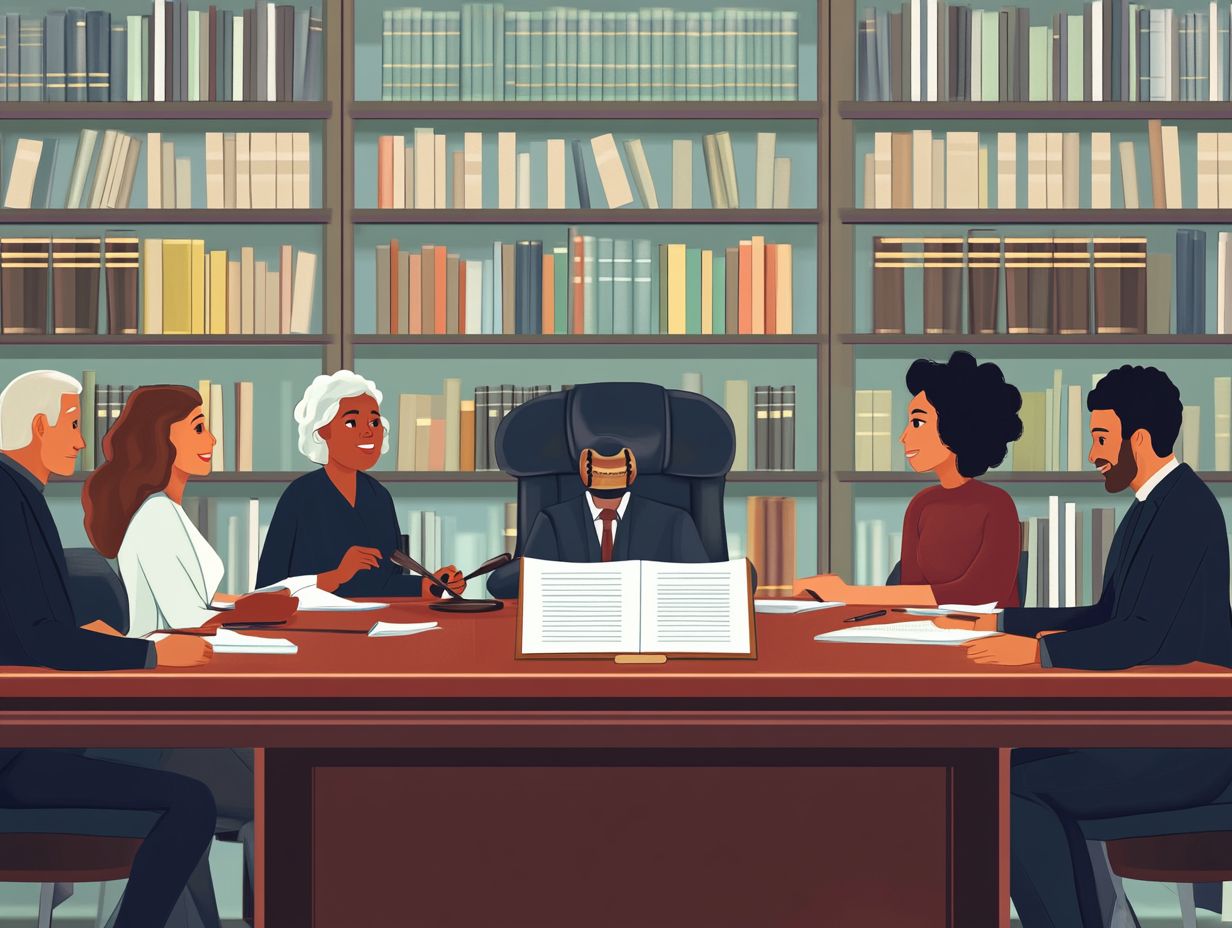
- Every individual has the right to legal representation, known as the right to counsel, regardless of their financial situation or the severity of the case.
- The right to counsel is crucial for ensuring fairness and justice in the legal system, as it allows for an adequate defense and protection of the defendant’s rights.
- In criminal cases, the right to counsel is guaranteed under the Sixth Amendment, while in civil cases it may vary depending on the specific circumstances.
- It is important to know when and how to exercise this right.
Understanding the Right to Counsel
The right to counsel, embedded in the Sixth Amendment of the United States Constitution, guarantees that criminal defendants can secure legal representation throughout criminal prosecutions. This safeguards their constitutional rights.
This right also includes less serious offenses and emphasizes the essential principle of fair treatment through the normal judicial system.
Having access to skilled defense attorneys is crucial for you as a defendant, enabling you to construct a robust defense and safeguard your interests within the judicial systems of states like California, Texas, and Pennsylvania.
What is the Right to Counsel?
The right to counsel is your legal guarantee to have an attorney represent you in court, particularly in criminal cases, as outlined by the Sixth Amendment.
At its core, this right embodies the fundamental belief that everyone deserves a fair trial, ensuring you have access to legal expertise and representation, even if your budget is tight.
Emerging from a deep-rooted history of legal principles designed to protect individual liberties, the right to counsel is a vital component of fair treatment in the judicial system. Your defense attorney is tasked with advocating for you, understanding legal processes, and ensuring that every detail of your case is meticulously addressed.
This right not only helps level the playing field between you and the prosecution but also reinforces the integrity of the judicial system. This ensures justice is accessible to everyone, making the legal system fairer for all.
The Importance of the Right to Counsel
The right to counsel plays a crucial role in protecting your rights in court. It ensures that defendants receive effective assistance and representation during their court proceedings, enabling them to navigate the complexities of the legal landscape with the support they truly deserve.
Ensuring Fairness in the Legal System
Ensuring fairness in the legal system fundamentally hinges on your right to counsel, which guarantees that you, regardless of your socioeconomic status, can access effective legal assistance.
The role of defense representation is crucial in safeguarding due process; it facilitates a fair trial and acts as a vital check against judicial arbitrariness.
Consider this: without competent legal representation, you may struggle to adequately challenge the prosecution’s evidence or grasp the complexities of the law, which can lead to serious miscarriages of justice.
Inadequate defense can pave the way for wrongful convictions or excessive sentences, especially in cases involving marginalized communities.
In such instances, judicial oversight becomes essential, as it must ensure that each trial aligns with the principles of justice, carefully scrutinizing any deficiencies in representation and their impact on case outcomes.
Conclusion: Understanding and exercising your right to a competent defense attorney is crucial in protecting your rights and ensuring that the legal system works effectively for you. If you need legal assistance, don’t hesitate to seek guidance from a qualified attorney.
When is the Right to Counsel Applicable?

The Right to Counsel is mainly important in criminal cases. Here, defendants can face jail time or serious charges.
Its importance also extends to civil cases that involve significant interests.
Criminal Cases
The Sixth Amendment guarantees your right to a lawyer in criminal cases. This is essential for navigating the legal system and ensuring a fair trial.
This right is most critical during key moments like arraignment, where your first plea can change the case’s direction.
Having a lawyer during plea negotiations can provide invaluable advice. They can help reduce potential sentences and protect you from unjust outcomes.
Landmark Supreme Court decisions, like Gideon v. Wainwright, confirm that this right must be upheld even in state courts.
Without effective representation during a trial, you risk a significant disadvantage, threatening the foundation of justice itself.
Civil Cases
While often associated with criminal cases, the Right to Counsel is increasingly recognized in civil matters, especially those involving constitutional rights.
In child custody disputes or homelessness issues, courts have acknowledged high stakes. For instance, the case of Lassiter v. Department of Social Services highlighted the need for legal representation in custody cases.
Similarly, the ruling in Turner v. Rogers emphasized the vital role of a lawyer in child support cases, acknowledging serious consequences without legal guidance.
These cases show that the judiciary increasingly recognizes the need for representation in civil matters where rights are at stake.
How to Obtain Legal Counsel
Getting a lawyer can vary based on your situation. You might explore options like public defenders for those who can’t afford private attorneys.
Public Defenders
Public defenders play a crucial role, providing essential legal help to those who cannot afford a lawyer. They handle heavy workloads, which can limit their ability to give each case the attention it deserves.
The challenges they face, such as limited resources, can affect defense strategies. It s vital to recognize their important work and ensure they receive adequate funding to advocate for justice.
Private Attorneys
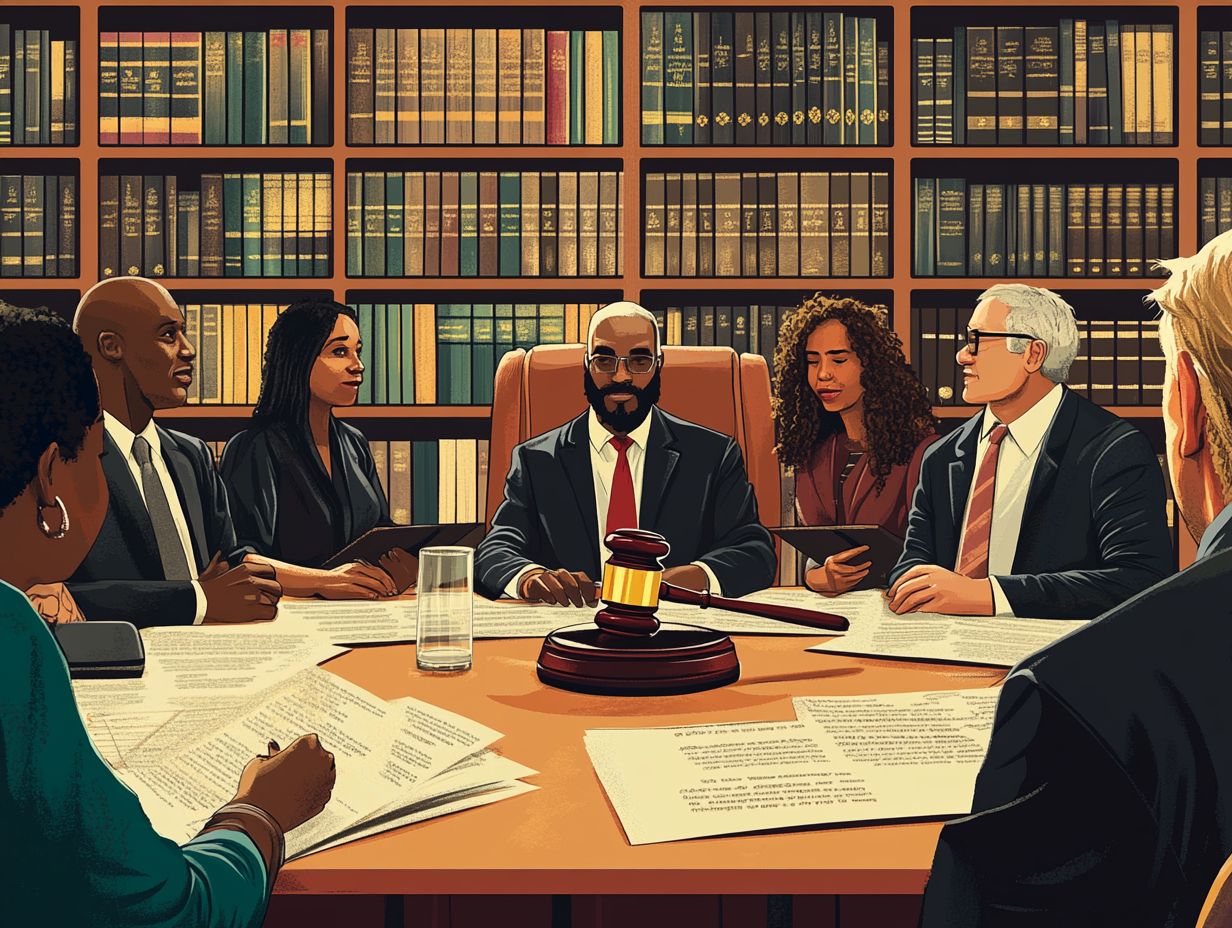
Private attorneys offer a compelling alternative for defendants seeking personalized lawyer support. They specialize in various areas of criminal charges and create tailored defense strategies for individual circumstances.
Their expertise goes beyond legal knowledge. These attorneys possess specialized skills and access invaluable resources that can significantly enhance your case.
When considering hiring a private attorney, assess their experience in the relevant field and their success rate with similar cases. It’s also important to evaluate their openness to communication.
Consider factors like attorney fees, availability, and a collaborative approach. This ensures you have a supportive environment throughout your legal journey.
By thoughtfully selecting a private attorney, you can better navigate the complexities of your charges.
Challenges to the Right to Counsel
Despite the established Right to Counsel, significant challenges may arise, including limited access to effective legal representation and ongoing debates about the adequacy of defense services.
Limitations and Controversies
The limitations and controversies surrounding the Right to Counsel often result in inadequate defense, raising serious questions about the fairness and integrity of our judicial systems.
In jurisdictions where public defender systems are severely underfunded, defendants often receive minimal representation. They may be rushed through critical stages of their cases, compromising their chances from the start.
This can lead to a lack of thorough evidence investigation and ineffective communication with clients. The stakes for defendants are immense, as their cases may hinge on intricate technicalities and procedural rights.
Such disparities challenge the notion of equality before the law and raise doubts about the efficacy of the legal process. The ideal of justice can wane when resources and attention are scarce.
Knowing Your Rights and Options
Understanding your defense rights and options is crucial for navigating the complexities of the legal landscape. With this knowledge, you can make informed decisions throughout your journey.
It’s vital to know that the prosecution may use various strategies that could significantly influence your case’s outcome. Seeking legal help is a crucial step. An experienced attorney can provide invaluable insights tailored to your situation.
Being proactive about learning your rights empowers you and prepares you for potential challenges. By understanding the implications of different prosecution practices, you will be better equipped to defend yourself and advocate for a fair resolution.
Frequently Asked Questions
What is the right to counsel?
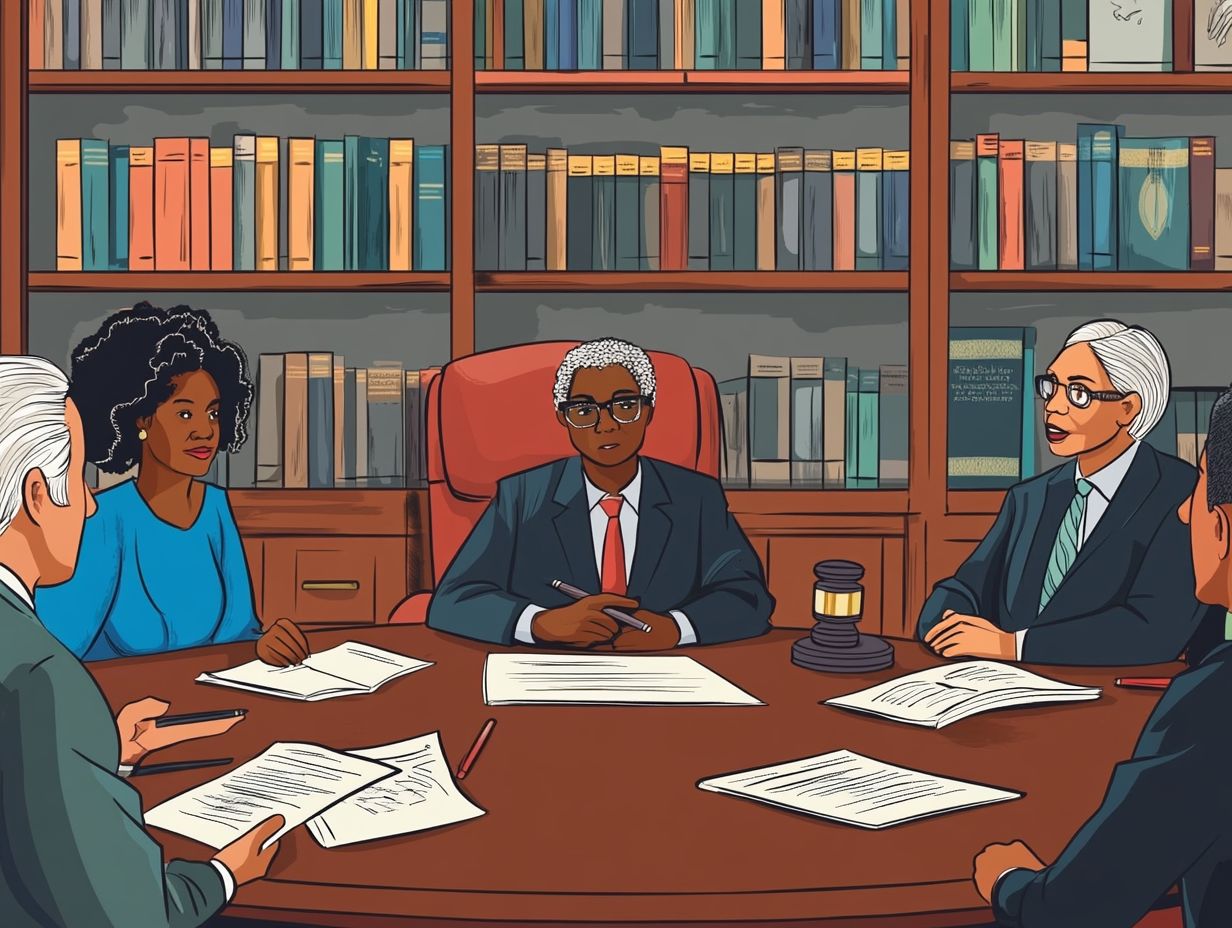
The Right to Counsel means you have the right to a lawyer when facing criminal charges.
When does the right to counsel apply?
The right to counsel applies in criminal cases, where individuals facing charges have the constitutional right to have an attorney represent them throughout the legal process.
Do I have the right to counsel if I cannot afford an attorney?
Yes! If you cannot afford an attorney, the court will appoint one for you at no cost. This is known as having a court-appointed attorney or a public defender.
Can I choose my own attorney?
In most cases, yes, you have the right to choose your own attorney. However, in certain situations, like when you cannot afford an attorney, the court will appoint one for you.
What if I do not want an attorney?
You have the right to represent yourself in court, but it is highly recommended that you have an attorney. A trained attorney can provide valuable legal advice and ensure your rights are protected throughout the process.
What if my right to a lawyer is violated?
If you think your right to a lawyer has been violated, act quickly. Talk to an attorney right away.
Your attorney will help you understand your rights. They can also take legal steps to protect them.

